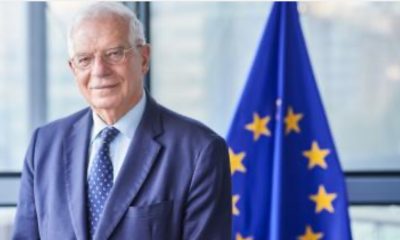EU
'EU should be more active in promoting a negotiated settlement in Kashmir'

 ‘Speaking with One Voice' is the theme of the eighth Kashmir-EU Week taking place in the European Parliament, 14-18 September. It will bring together academics, Non-Governmental Organisations (NGOs), experts and parliamentarians from Europe and Kashmir.
‘Speaking with One Voice' is the theme of the eighth Kashmir-EU Week taking place in the European Parliament, 14-18 September. It will bring together academics, Non-Governmental Organisations (NGOs), experts and parliamentarians from Europe and Kashmir.
Its aim: to raise public awareness in Europe of the 68-year-old conflict in Kashmir and persuade Europeans legislators to engage in promoting a negotiated settlement. Debate will revolve around two conferences: “What really is the way ahead”, led by Member of the European Parliament Sajjad Karim MEP (UK, ECR) who is hosting Kashmir-EU Week, and 'Emerging shadows of war', the opening speech by Farzana Ahmed, Minister for Social Welfare and Women's Development in the Azad Kashmir administration.
"Ordinary Europeans have little or no knowledge of the situation there and MEPs’ engagement is enhanced by such awareness raising," said Sajjad Karim. "Human rights violations: murder, rape, disappearances, torture, the use of pellet guns by the Indian authorities and lack of freedom of speech are everyday occurrences." Khurram Parvez, a Kashmiri human rights activist, will draw attention to a recent report by the NGO, 'Parents of Disappeared People.' It accuses 972 Indian officials of torture, rape, forced disappearances and extrajudicial killings.
“Those responsible must be brought to justice,” said Kashmir Council-EU Chairman Ali Raza Syed - an NGO organizing Kashmir-EU Week along with International Council for Human Development and the World Kashmir Diaspora Alliance. “It is a tragic conflict where every passing hour brings misery to the people of Indian occupied Kashmir. The human cost of this tragedy is far too high; this conflict must have a just resolution, otherwise it can provoke nuclear war and destruction,” said Ali Raza Syed.
Particularly worrying, he added, is the recent withdrawal by India from National Security Adviser level negotiations with Pakistan. “The world must take note and pressurize India to come back to the negotiating table to resolve all outstanding issue with Pakistan including the issue of Kashmir,” he added.
Both the United Nations and European Parliament have already passed resolutions on the right of self-determination of Kashmiris. Participants at Kashmir-EU Week will draw up a final conference resolution that is expected to call on the EU to use its good relations with both India and Pakistan to encourage both countries to sit around the negotiating table.
"I hope that by increasing people's knowledge here of the situation in Kashmir, we can compel the EU to play a more active role in promoting a negotiated settlement which involves the people of Kashmir and resolve this ongoing conflict once and for all, whilst eliminating the risk to the world as a whole of conflict between nuclear armed neighbours," said Sajjad Karim. Running parallel to debate, the Kashmir exhibition is a display of Kashmiri crafts, weaving and needlework. It also features photographs on the theme of ‘Paradise Lost’, capturing through a lens beauty and promise contrasted by anguish and loss.
Another major event – a Youth Leadership Forum for Kashmiri students – will be organized by the Kashmir Council EU in the second week of January 2016. Its aim is to promote the highest standards of good governance in Kashmir – including within the civil service – and define a role for the future leadership in achieving a lasting solution to conflict in the region. “The Forum will be an important means of highlighting the future leadership of Kashmir," said Azad Kashmir President Yaqoob Khan. “The EU-Kashmir Council is delighted at the level of interest in these intiatives,” Ali Raza Syed concluded.
www.facebook.com/kashmircouncil.eu Twitter: @KashmirCouncil1
Share this article:
-

 Conferences3 days ago
Conferences3 days agoNatCon’s on-off conference halted by Brussels police
-

 Mass surveillance4 days ago
Mass surveillance4 days agoLeak: EU interior ministers want to exempt themselves from chat control bulk scanning of private messages
-

 Conferences4 days ago
Conferences4 days agoNatCon conference to go ahead at new Brussels venue
-

 European External Action Service (EAAS)4 days ago
European External Action Service (EAAS)4 days agoBorrell writes his job description



























